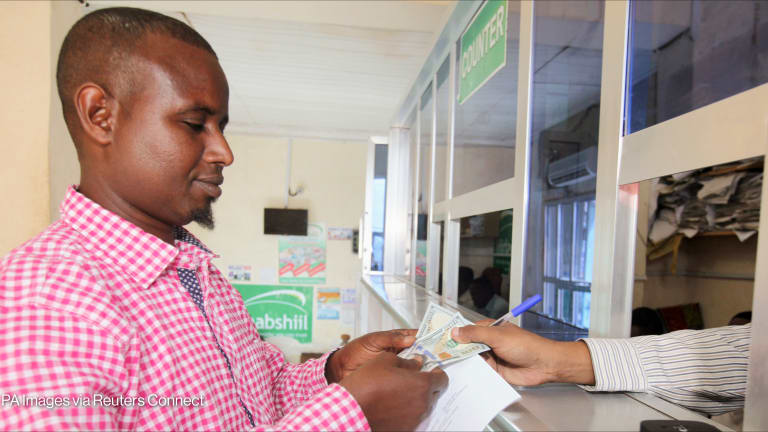
The Bill & Melinda Gates Foundation has tapped a billionaire philanthropist, an economist, a co-founder of one of the world’s most prominent philanthropic advisory firms, and the foundation’s own CEO to join its new board of trustees and sit alongside co-chairs Bill Gates and Melinda French Gates at the top of the leading philanthropic foundation.
The new trustees will add some geographic, racial, and gender diversity to the foundation’s leadership, though their backgrounds and previous work with global institutions don’t suggest they will bring markedly different points of view to the foundation.
The Gates Foundation announced Wednesday that it had appointed Zimbabwean billionaire businessman and philanthropist Strive Masiyiwa, London School of Economics Director Minouche Shafik, The Bridgespan Group’s co-founder and co-chair Thomas J. Tierney, and Gates Foundation CEO Mark Suzman to its board of trustees.
They will join foundation co-chairs Gates and French Gates, who divorced last year and have been the only two trustees since the third trustee, billionaire philanthropist Warren Buffett, resigned from the post in June. Gates and French Gates also have agreed that she could resign within two years of their divorce if either found that they could not amicably work together.
Gates and French Gates recognized, especially after their divorce, that the foundation would be well served by the addition of “strong, independent voices,” Suzman wrote in a letter. The new trustees will provide “additional input, strategic guidance, and fiduciary oversight to the foundation” and “bring diverse perspectives and expertise that will help to ensure the future stability and impact of the foundation,” he said.
The selection of both Masiyiwa and Shafik appears to align with the Gates Foundation’s prioritization of pandemic preparedness and economic recovery. Masiyiwa is the African Union’s special envoy on COVID-19. The Egyptian-born, British-American Shafik previously held posts at the World Bank and the International Monetary Fund and is the author of “What We Owe Each Other: A New Social Contract for a Better Society,” which discussed how countries can provide basic health care and education and other resources in the 21st century.
Meanwhile, Tierney’s selection reflects the growing prominence of The Bridgespan Group, whose client roster includes billionaire philanthropist MacKenzie Scott, the ex-wife of Amazon founder Jeff Bezos, as well as the Gates Foundation, Ford Foundation, and Rockefeller Foundation.
Suzman described the new trustees as an “initial slate” in his letter. He said the foundation is still searching for additional trustees to “enhance representation across gender, geography, and expertise” and could eventually have up to nine members total. Philanthropy experts previously told Devex that diversity, increased accountability, and transparency should be important factors for the foundation to consider as it mulled governance changes.
Suzman also acknowledged that “constant scrutiny” was necessary to keep the foundation effective. In the letter, he recalled a conversation that he had with Buffett during which Buffett warned him about “three perennial threats” to large organizations like the Gates Foundation: arrogance, bureaucracy, and complacency.
“There is no simple solution to avoiding these pitfalls,” Suzman wrote. “It requires constant scrutiny—actively seeking out and being open to constructive criticism from diverse voices, transparently using our internal and external review processes to ruthlessly prioritize areas where our potential impact is greatest, resisting mission creep, and staying focused.”
One of the areas that Bill Gates has said he will remain focused on this year is pandemic preparedness. During the 2022 NORAD Conference Tuesday, he said that it would be among his top priorities along with addressing climate change.
“We can’t afford to get caught flat-footed again, or to have another inequitable response,” Gates said.
However, Gates has also faced criticism for his initial opposition to temporarily lifting COVID-19 vaccine patent protections — a position that was shared by the Gates Foundation before it reversed course last year. Masiyiwa, meanwhile, has criticized both the European Union and the United States for not doing more to distribute vaccines to the African continent — and has been vocal about making African nations less dependent on the West for vaccine supplies.
For the time being, Gates and French Gates have said that they both remain committed to the foundation and announced last year that they would add $15 billion to the foundation’s endowment — their largest contribution since 2000 — bringing the total endowment to approximately $65 billion.
“Bill and Melinda Gates are still holding on as the main decision-makers of the organization, and these advisers are coming in to advise, not as equal decision-making actors.”
— Maribel Morey, a historian of U.S. philanthropiesThe Gates Foundation has been co-chaired by Gates and French Gates since the year 2000 and has primarily focused on their interest areas. French Gates, for example, has been the face of the foundation’s gender equity work. The only other person who has served in a co-chair role is Gates’ father, William H. Gates, who died in 2020.
Suzman, along with the foundation’s chief legal officer Connie Collingsworth, conducted a strategic review to expand the foundation’s governance at Gates’ and French Gates’ request, according to a press release.
The new trustees will serve three-year terms with a limit of two consecutive terms. The board will meet three times per year and will approve an annual budget and four-year plan, as well as review the CEO’s performance and approve the CEO’s compensation.
The Gates Foundation also released additional details about how the board would operate in a list of governing principles. For example, outside of the foundation’s CEO, no employees nor relatives of Gates or French Gates — “other than a child of the marriage” — will be permitted to serve on the board.
The foundation is clearly trying to strike a balance between continuing to operate as a family foundation and being more publicly accountable, said Benjamin Soskis, a senior research associate in the Center on Nonprofits and Philanthropy at the Urban Institute, which receives funding from the Gates Foundation.
He said the hybrid approach of expanding the board to increase public accountability while still relying on the private family foundation model reflects the ambiguity of the foundation’s role as one of the most powerful private philanthropies in the world.
“The Gates Foundation has long existed in this kind of weird twilight zone between public and private,” he said. “It is often one of the few private institutions that work alongside public, multilateral institutions.”
However, some are questioning how far the board will push the co-chairs toward changing their approach to philanthropy.
Notably, a video released with the announcement features Gates, French Gates, and Suzman but none of the other board members, said Maribel Morey, a historian of U.S. philanthropies and the author of “White Philanthropy.” Additionally, Gates and French Gates frame the addition of the board members as helping them with their thinking, Morey said.
“It suggests that Bill and Melinda Gates are still holding on as the main decision-makers of the organization, and these advisers are coming in to advise, not as equal decision-making actors on the board,” she said.
Morey also noted that all of the outside board members had previously worked with the Gateses or had similar backgrounds. Masiyiwa, for example, has signed the Giving Pledge, which Gates and French Gates created with Buffett to encourage the wealthy to give the majority of their money to charities during their lifetimes or upon their deaths. The new board members will likely share the co-chairs’ “neoliberal” way of thinking, which doesn’t suggest a significant shift in the foundation’s funding practices, Morey said.
“It’s not exciting because it’s more of the same, in many ways,” she said. “And I don’t think that this moment calls for more of the same.”
A more remarkable move would have been selecting board members who are publicly known for using a “critical lens” on the foundation’s funding practices in areas such as public health and education, Morey said. However, even if those voices are added later, their level of potential impact would be questionable now, given the makeup of the rest of the board, she said.
Adding board members with more experience “in the field” who could represent the point of view of grantees would still be worthwhile — and could set a precedent for other large foundations that have been slow to get on board with the concept of including grantees in decision-making processes, said Stephanie Ellis-Smith, a philanthropy adviser and co-founder at Giving Gap, which connects donors to Black-led nonprofits.
Update, Jan. 26, 2022: This article has been updated with reaction and insight on the new trustees from outside experts, as well as additional details from the Gates Foundation.








